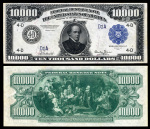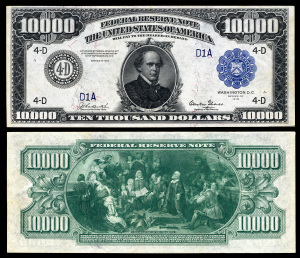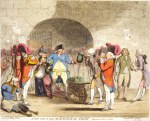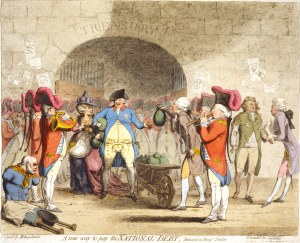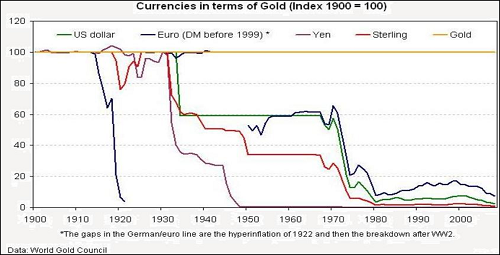submitted by jwithrow.
Journal of a Wayward Philosopher
Real History
October 15, 2014
Hot Springs, VA
The S&P is checking in at $1,851 today, gold is up to $1,236, oil is down to $80.34, bitcoin is around $396, and the 10-year has plummeted to 2.01%. The 10-year Treasury rate must have been afraid of its shadow this week.
Wife Rachel said my entry yesterday about the history of fiat currency bored her so much she fell asleep reading it. Sorry about that.
I see history as quite fascinating. Not the history that comes in Department of Education approved politically correct textbooks, mind you, but real history. Real history isn’t piecemeal highlights with names, places, and dates to remember; it is so much more important than that. Real history doesn’t show up in textbooks or in classrooms.
Real history is friend Wade’s family letters housed on his family farm in South Carolina. The letters were written by the original owners of the farm – his ancestors – and they have been passed down from generation to generation since. Real history is a five-bedroom brick home sitting atop “town hill” in Covington, Virginia built by my great-great-grandfather after emigrating from Lebanon in the late 19th century and opening a restaurant. This house comes complete with a Lebanese-style tiered garden on the side of the mountain. I can only imagine how many other pieces of real history are out there, passed down from generation to generation and discussed over Thanksgiving dinner.
But what is important with real history? Not so much the names, dates, and places as interesting as they may be. Instead, it is the ideas, values, and lessons that come with real history that are really important. These intangibles, if heeded, are what truly shape the future.
The textbook history tells me Napoleon invaded Russia and his army got wiped out. What do I learn from this? Don’t invade Russia? I will be sure not to make that mistake. Real history tells me great-great-grandfather emigrated from Lebanon, opened a restaurant, and worked like crazy to create a better life for his family. I am a part of that legacy. What do I learn from this? Free enterprise has the power to liberate and elevate individuals, families, and communities. This is a real, actionable lesson that is much more valuable to me than learning not to invade Russia.
Real history is mostly ‘private’ information while textbook history is ‘public’ information. What’s taught in the classroom and what comes on the news is also public information. Our society places a very high value on this public information; we love to hang around the water cooler and talk about it. It is to the point now where we seem to think that public information is all there is. We think the school teaches us everything we need to know and we think the news reports all aspects of all events to us every day.
Our worldview, which determines how we think and act, is shaped by this public information.
The problem is public information is riddled with holes and often less than helpful. “Don’t invade Russia” is sound advice but I was extremely unlikely to do so in the first place. If we value public information then we waste quite a bit of time on things that aren’t very relevant to us at all. Should Ray Rice have been banned? Should I buy Alibaba stock post-IPO? How will the mid-term elections go? Who will run for President in 2016?
Who cares?!
Football is just entertainment and unless you had Ray Rice on your fantasy team his private life probably doesn’t concern you much. Alibaba is the largest e-commerce company in the world and its IPO was welcomed with all manner of press and hoopla. But IPOs are designed for the insiders to get rich by selling their private stock to the public at an inflated valuation. This works best when the media pumps up the IPO story over and over again. You don’t want to be on the public side of an IPO, you want to be on the private side. And the mid-term elections are largely irrelevant as is the presidential election in 2016. No matter who wins the debt will continue to spiral out of control until the U.S. dollar is supplanted from its perch as the international reserve currency… probably by the IMF’s “Special Drawing Rights” (SDR). No amount of campaigning and voting will prepare you for the inevitable; probably best to stop wasting time and start preparing for the Great Reset now.
Public information is similar to the fiat currency we discussed yesterday. Maybe a little bit of it won’t do too much harm but go past that line and you are going to be in a world of financial hurt. So in this humble philosopher’s opinion: focus on real history and private information. The rest is probably just noise.
Hopefully this one doesn’t put wife to sleep. On second thought, maybe it’s for the best.
More to come,
Joe Withrow
Wayward Philosopher
For more of Joe’s thoughts on the Great Reset and regaining individual sovereignty please read “The Individual is Rising” which is available at http://www.theindividualisrising.com. The book is also available on Amazon in both paperback and Kindle editions.


